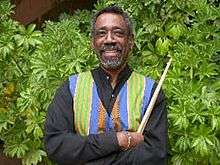Sherman Ferguson
| Sherman Ferguson | |
|---|---|
| Born | October 31, 1944 |
| Died | January 22, 2006 |
| Genres | Jazz |
| Occupation(s) |
Jazz musician Artist |
| Instruments | Drums |
| Years active | 1960s - 2000s |
| Labels | ITI Records, Muse Records |
| Associated acts |
Catalyst Heard Ranier Ferguson |

Sherman Ferguson (October 31, 1944, Philadelphia – January 22, 2006) was an American jazz drummer. For a time he was a member of the Jazz trio Heard Ranier Ferguson.[1]
Background
Ferguson once said that when people asked him what he did, he'd tell them he wouldn't tell them he was a musician, he'd say he was a jazz musician. He said he was proud of it and he would wear it as a statement on his forehead if he could.[2]
He also wrote liner notes and was a contributing writer. He wrote liner notes and articles for jazz magazines such as Bird and L.A. Jazz Scene.[3][4]
Ferguson first played professionally around 1963, working with Charles Earland, Shirley Scott, Don Patterson, and Groove Holmes. he also recorded frequently with Pat Martino.[5] Concomitantly he worked as a child tutor for the Model Cities program in Philadelphia. He was a founding member of Catalyst, a jazz fusion ensemble, in 1970, remaining with them until their breakup. He then moved to Los Angeles, where he became a prolific session musician, playing on albums by Dizzy Gillespie, Horace Silver, and Benny Carter among many others.[6] He formed a trio with John Heard and Tom Ranier.[7] He taught jazz theory at UCLA, UC-Irvine, and Jackson State University.[8] He released the album Welcome to My Vision, on his own label Jazz-a-nance in 2002.[9] Among the tracks on the album were "Lush Life", "Lester Left Town" and Bobby Watson's "Monk He See, Monk He Do". The band comprised Ferguson on drums, saxophonists Louis Van Taylor and Carl Randall and bassist Trevor Ware.[10]
On January 22, 2006, Ferguson died at his La Crescenta home aged 61. The death was a result of diabetes.[11]
Discography
As leader
- Sherman Ferguson's Jazz Union - Welcome to My Vision
As credited member
- Catalyst - Catalyst - Cobblestone – CST 9018 (1972) [12]
- Catalyst - Perception - Muse Records – MR 5025 (1973) [13]
- Catalyst - Unity - Muse Records – MR 5042 (1974) [14]
- Catalyst - A Tear And A Smile - Muse Records – MR 5069 (1976) [15]
- Heard Ranier Ferguson - ITI Records – JL 003 - 1983 [16]
as sideman
With Pat Martino
- Desperado (Prestige, 1970)
- Pat Martino/Live! (Muse, 1972 [1974])
- Consciousness (Muse, 1974)
- Interchange (Muse, 1994)
With Bud Shank
- California Concert (Contemporary, 1985) with Shorty Rogers
- Serious Swingers (Contemporary, 1987) with Bill Perkins
Links
Further reading
References
- ↑ The Pittsburgh Press Thursday November 17, 1983 Music/Film, Trio dominates electronic 'Road Games' by Bob Karlovits, "Heard Ranier Ferguson:" ITI Records
- ↑ Los Angeles Times January 31, 2006 Obituaries Sherman Ferguson, 61; Drummer Played With Top Names in Jazz
- ↑ UCLA Newsroom February 07, 2006 In Memoriam Sherman Ferguson
- ↑ JazzHOUSE.org The Last Post Sherman Ferguson L.A. session drummer, teacher by Todd S. Jenkins
- ↑ Oxford Index Reference Entry Ferguson, Sherman (born 1944), drummer
- ↑ Allmusic Sherman Ferguson Artist Biography by Jason Ankeny
- ↑ The UCLA Herb Alpert School of Music, Department of Ethnomusicology UCLA Obituary: Sherman Ferguson
- ↑ Allmusic Sherman Ferguson Artist Biography by Jason Ankeny
- ↑ Allmusic Sherman Ferguson Artist Biography by Jason Ankeny
- ↑ JazzTimes November 2002 Sherman Ferguson's JazzUnion Welcome to My Vision By Larry Appelbaum
- ↑ Los Angeles Times January 31, 2006 Obituaries Sherman Ferguson, 61; Drummer Played With Top Names in Jazz
- ↑ Discogs Catalyst (4) – Catalyst
- ↑ Discogs Catalyst (4) – Perception
- ↑ Discogs Catalyst (4)– Unity
- ↑ Discogs Catalyst (4) – A Tear And A Smile
- ↑ Discogs Heard* - Ranier* - Ferguson* – Heard Ranier Ferguson
References II
- Jason Ankeny, Sherman Ferguson at Allmusic
- Listening In: An Interview with Sherman Ferguson by Bob Rosenbaum, Los Angeles, September 1981 (PDF file)
|